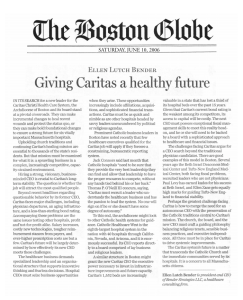Giving Caritas a healthy future
 In its search for a new leader for the Caritas Christi Health Care System, the Archdiocese of Boston and its board stand at a pivotal crossroads. They can make incremental changes to heal recent wounds and protect the status quo, or they can make bold foundational changes to ensure a strong future for six vitally important Massachusetts hospitals.
In its search for a new leader for the Caritas Christi Health Care System, the Archdiocese of Boston and its board stand at a pivotal crossroads. They can make incremental changes to heal recent wounds and protect the status quo, or they can make bold foundational changes to ensure a strong future for six vitally important Massachusetts hospitals.
Upholding church conditions and continuing Caritas’s healing mission are essential to thousands of the state’s residents. But that mission must be examined for what it is: a sprawling business in a complex, increasingly competitive, capacity-strained environment.
Hiring a strong, visionary, business-minded CEO is crucial to Caritas’s long-term stability. The question is whether the job will attract the most qualified people.
Beyond recent headlines regarding questionable behavior by its former CEO, Caritas faces major challenges, including physician departures, an aging infrastructure, and a less-than-sterling bond rating. Accompanying these problems are the same issues testing other hospitals, profit and not-for-profit alike. Salary increases, costly new technologies, tougher reimbursement stances from payers, and ever-higher prescription costs are but a few. Caritas’s future will be largely determined by how effectively its new CEO meets these challenges.
The health care business demands specialized leadership and an organizational structure that supports innovative thinking and fearless decisions. Hospital CEOs must seize business opportunities when they arise. These opportunities increasingly include affiliations, acquisitions, and sophisticated financial transactions. Caritas must be as quick and nimble as are other hospitals headed by savvy leaders unencumbered by political or religious agendas.
Prominent Catholic business leaders in Boston have noted recently that few health care executives qualified for the Caritas job will apply if they foresee a constraining, bureaucratic reporting system.
Jack Connors said last month that Catholic hospitals “need to be sure that they provide the very best leadership they can find and allow that leadership to have the proper resources to compete, without any hands tied behind his or her back.” Thomas P. O’Neill III concurs, saying, “Caritas must recruit a leader who understands the health care business and has the passion to lead the system. No one will sign on if he or she doesn’t have some degree of autonomy.”
To this end, the archdiocese might look to other Catholic health systems for guidance. Catholic Health Care West is the eighth-largest hospital system in the nation with 40 hospitals through California, Nevada, and Arizona, and it is enormously successful. Its CEO reports directly to a board comprised of lay business and religious leaders.
A similar structure in Boston might grant the new Caritas CEO the executive power necessary to invest in infrastructure improvements and future capacity. Caritas’s 1,552 beds are increasingly valuable in a state that has lost a third of its hospital beds over the past 15 years. Given that Caritas’s current bond rating is the weakest among its competitors, its access to capital will be costly. The next CEO must possess exceptional fiscal management skills to meet this reality head-on, and he or she will need to be backed by a board with a sophisticated approach to health care and financial issues.
The challenges facing Caritas argue for a CEO search beyond the traditional physician candidates. There are good examples of this model in Boston. Several years ago the Beth Israel Deaconess Medical Center and Tufts-New England Medical Center, both facing fiscal problems, recruited leaders who are not physicians. Paul Levy has earned kudos for his success at Beth Israel, and Ellen Zane gets equally high marks for guiding Tufts-New England to financial stability.
Perhaps the greatest challenge facing Caritas is how to merge the need for an autonomous CEO with the preservation of the Catholic traditions central to Caritas’s mission. The church, the board, and the new CEO must craft a guiding philosophy balancing religious tenets, sensible business practices, and executive independence. All three must be in place for Caritas to drive systematic improvements.
The Caritas system’s future is a matter that transcends the Catholic Church and the immediate communities served by its hospitals. It is a concern to all Massachusetts citizens.

